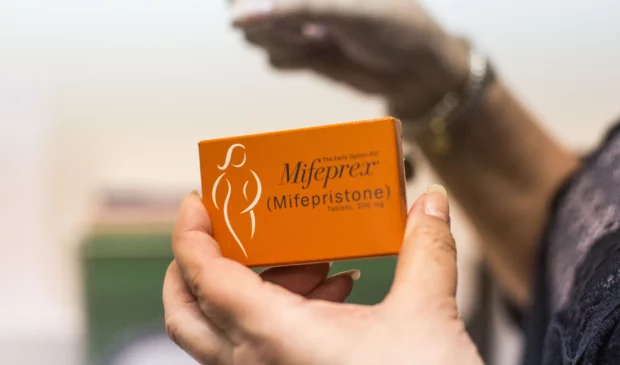Newsletter Signup
The Austin Monitor thanks its sponsors. Become one.
Most Popular Stories
- The Austin area won’t be seeing a lot of bluebonnets this year. Here’s why.
- SXSW shrinks as indie venues contemplate competitiveness
- Council members celebrate unanimous defeat of bill that proposed putting Austin under state control
- Eviction crisis spreads as affordability pressures worsen
- City pauses $10M in airport art over concerns local creatives were excluded
-
Discover News By District

Photo by Gabriel C. Pérez/KUT News
Requests for abortion pills surged amid threats to reproductive rights, UT-based study shows
Monday, January 8, 2024 by Olivia Aldridge, KUT
Advance requests for abortion medication surged when the U.S. Supreme Court’s decision overturning Roe v. Wade was leaked, a new study has found.
The study in JAMA Internal Medicine looked at requests for the abortion medications mifepristone and misoprostol from the telemedicine service Aid Access between September 2021 and April 2023. Specifically, it tracked what are called “advance provision” requests – prescriptions for patients who are not pregnant but who want the drugs on hand for possible future use.
Those requests substantially increased after the court’s decision overturning Roe was leaked in 2022 and again following conflicting rulings in April 2023 that could affect the availability of mifepristone. An increase in requests did not occur in most states, however, after the court released its official decision in Dobbs v. Jackson Women’s Health Organization, which revoked the federal right to abortion.
“Advance provision by its nature is really the idea of preparing for something that you might need in the future, and it does seem that the increases in requests are being driven by the potential legislation that might be enacted, rather than as a response to its actual enforcement,” said Abigail Aiken, an associate professor at UT’s LBJ School of Public Affairs and a co-author of the study.
Aiken said physicians don’t routinely prescribe abortion drugs in advance of pregnancy, and Aid Access became the first telemedicine organization to offer the service in September 2021. During the study period, it received more than 48,000 of these requests.
Around three-quarters of people who made the requests said they wanted the drugs “to ensure personal health and choice” and “to prepare for possible abortion restrictions.”
“There is, it seems, widespread demand,” Aiken said.
That demand was higher among certain demographics. Unlike patients who sought a prescription from Aid Access because they were already pregnant, people who requested the drugs in advance tended to be white women living in urban areas who were over the age of 30. They also were more often child-free.
“Those differences might point to access barriers or information barriers, meaning that some groups in society might be less likely to either know about or be able to access an advance provision service,” Aiken said. “That’s something that we don’t fully understand from this study, and that would require further research.”
With the Supreme Court set to consider a case this year that could affect access to abortion medication via mail and telemedicine, Aiken said she would be watching the data to see if another surge in advance provision requests occurs.
This story was produced as part of the Austin Monitor’s reporting partnership with KUT.
The Austin Monitor’s work is made possible by donations from the community. Though our reporting covers donors from time to time, we are careful to keep business and editorial efforts separate while maintaining transparency. A complete list of donors is available here, and our code of ethics is explained here.
You're a community leader
And we’re honored you look to us for serious, in-depth news. You know a strong community needs local and dedicated watchdog reporting. We’re here for you and that won’t change. Now will you take the powerful next step and support our nonprofit news organization?






